Abstract
Hybridomas secreting monoclonal antibodies specific for Pseudomonas aeruginosa outer membrane antigens were isolated. One of the antibodies was highly specific for the O antigen of the lipopolysaccharide of International Antigen Typing Scheme serotype 5 strains, reacting only weakly with a serotype 17 strain and failing to react with the outer membranes of strains representing 15 other serotypes. This monoclonal antibody was able to agglutinate heat-killed bacterial cells as well as lipopolysaccharide-coated sheep erythrocytes. Two other monoclonal antibodies were able to interact with the outer membranes of strains representing all 17 serotypes, although they were unable to agglutinate heat-killed bacterial cells. One of these was shown to be specific for the major outer membrane lipoprotein H2. The antigenic site against which this monoclonal antibody reacted was present in the outer membranes of two Pseudomonas fluorescens strains, two Pseudomonas putida strains, a Pseudomonas anguilliseptica strain, and an Azotobacter vinelandii strain, but not in the outer membranes of five other bacterial species.
Full text
PDF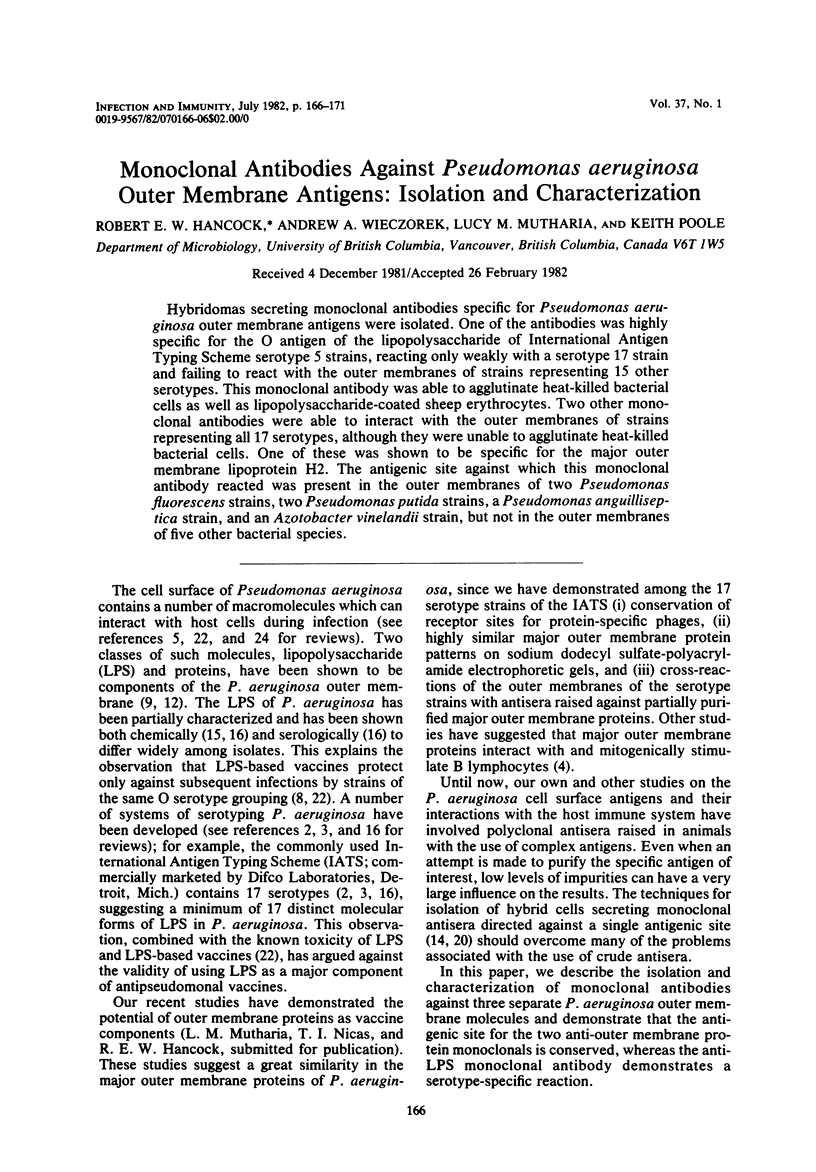
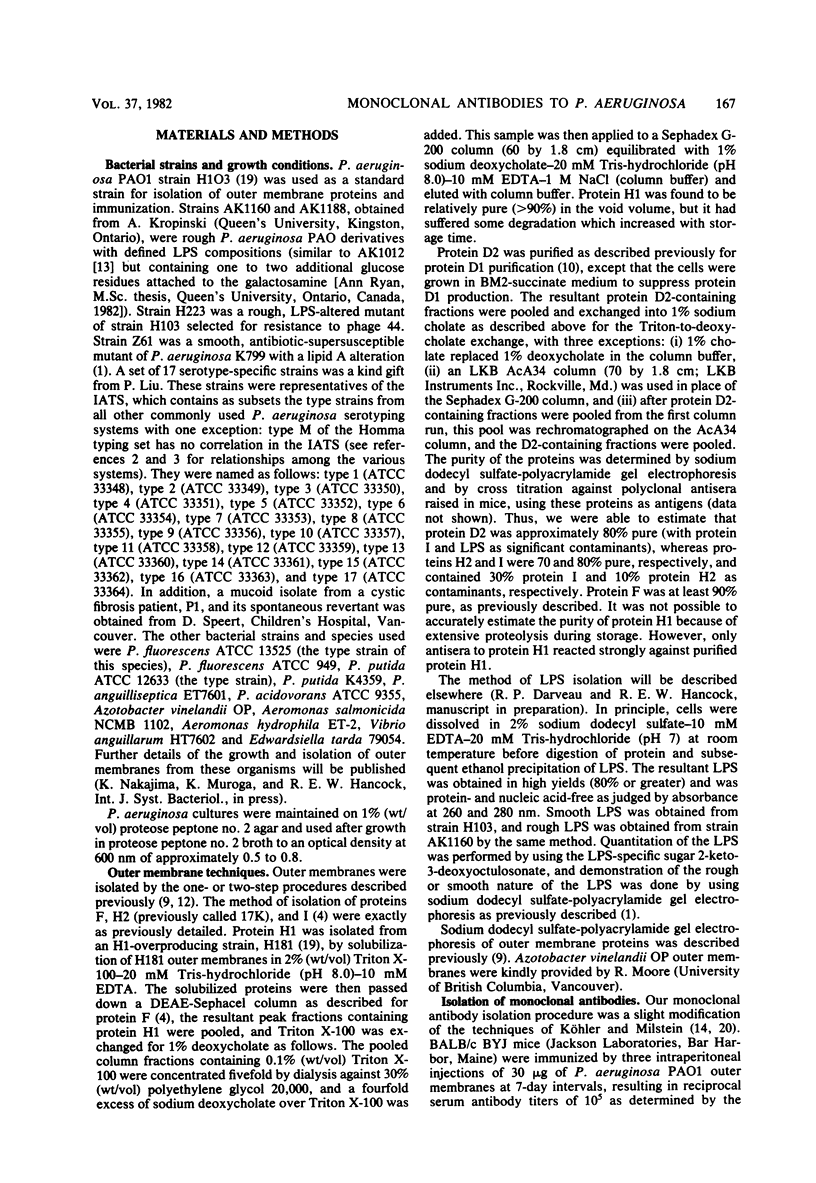
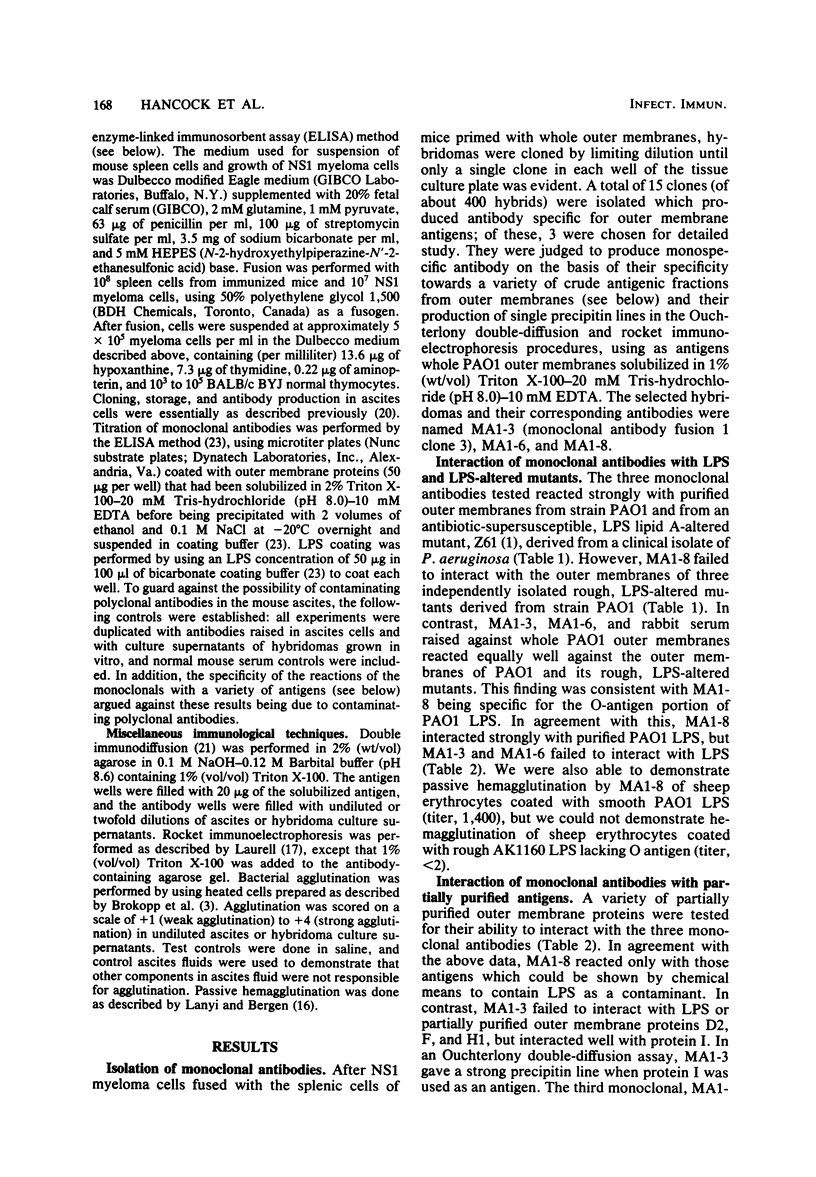
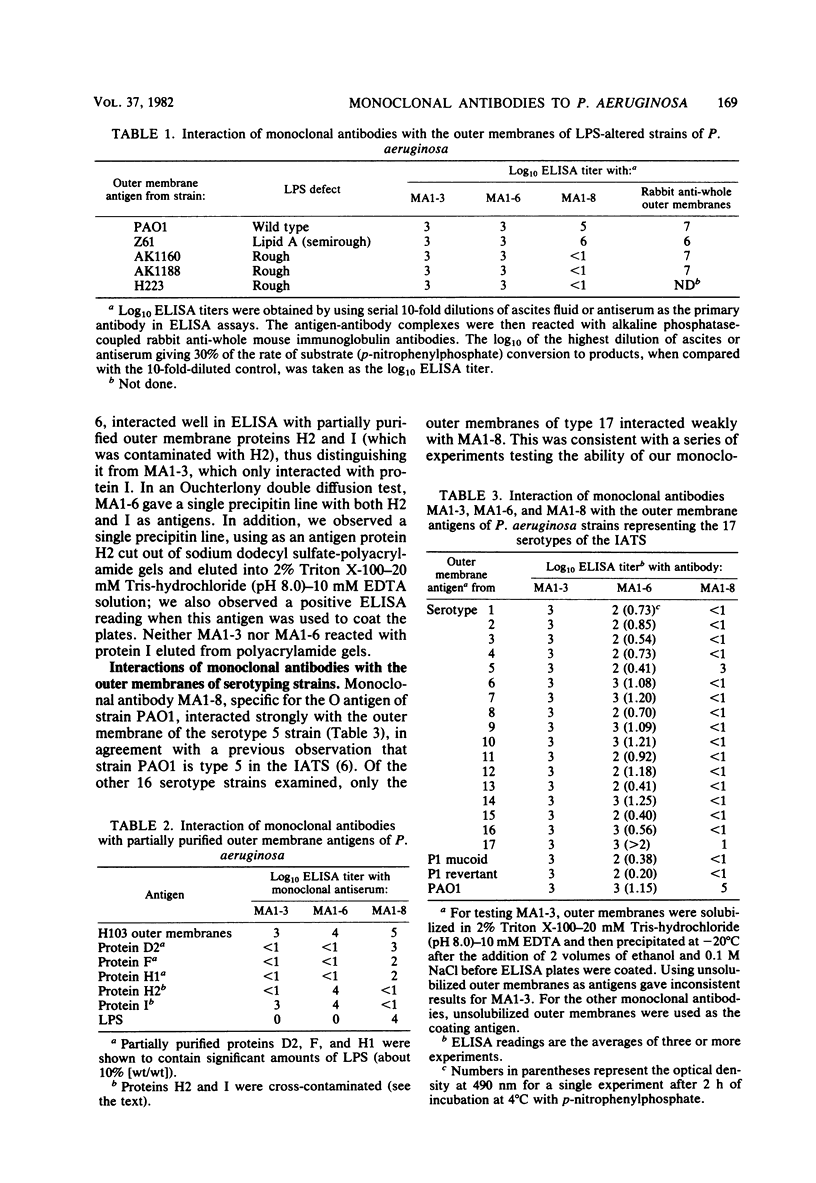
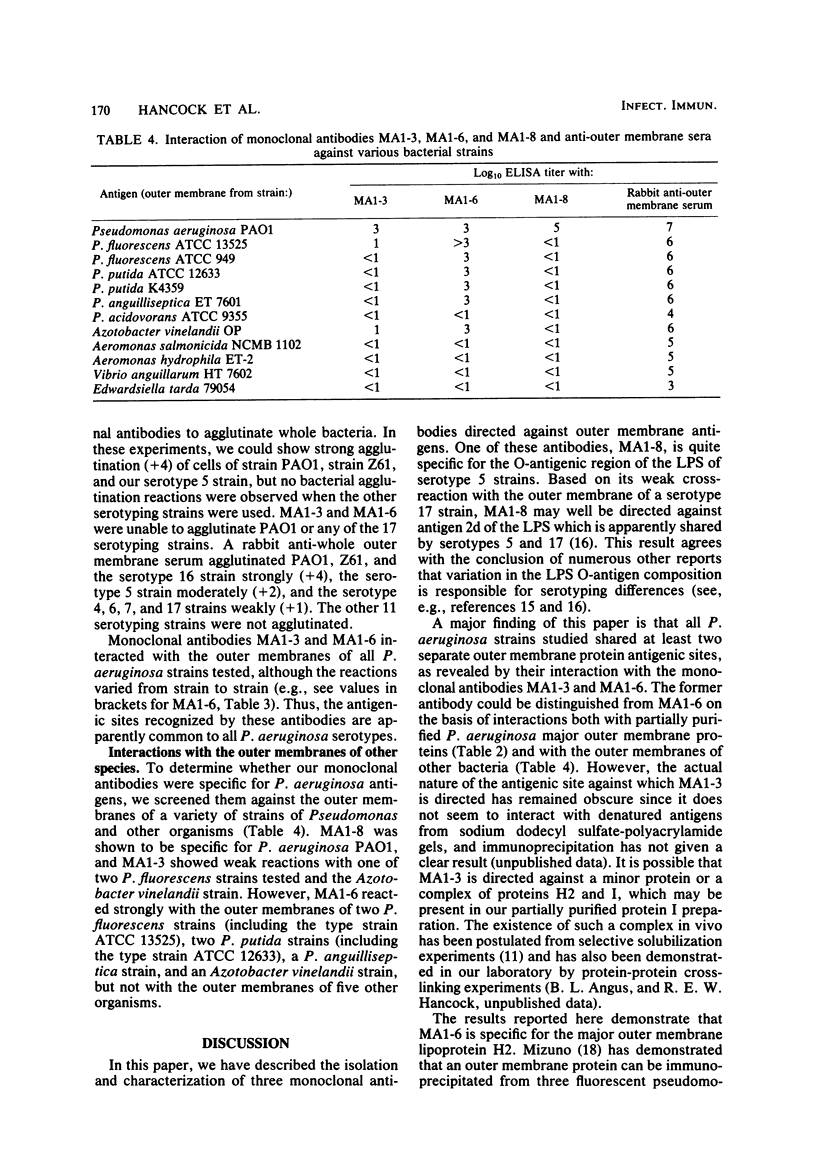
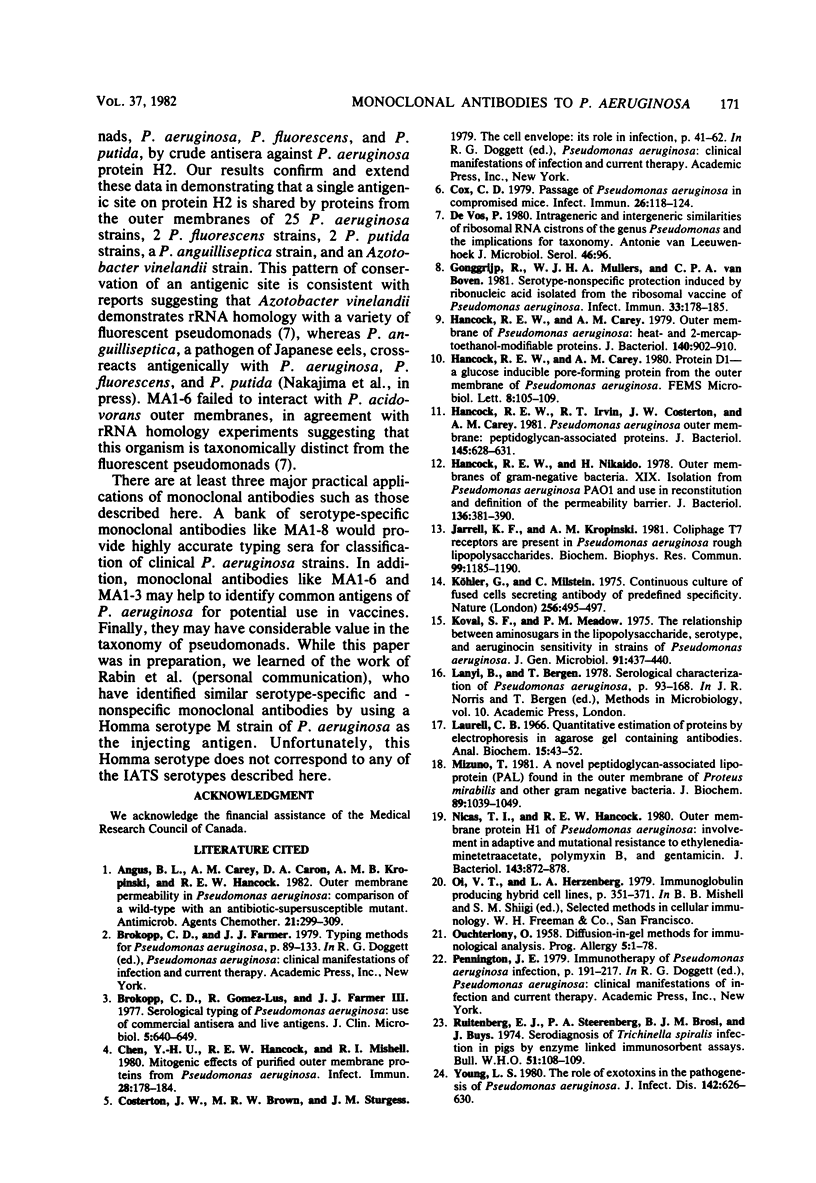
Selected References
These references are in PubMed. This may not be the complete list of references from this article.
- Angus B. L., Carey A. M., Caron D. A., Kropinski A. M., Hancock R. E. Outer membrane permeability in Pseudomonas aeruginosa: comparison of a wild-type with an antibiotic-supersusceptible mutant. Antimicrob Agents Chemother. 1982 Feb;21(2):299–309. doi: 10.1128/aac.21.2.299. [DOI] [PMC free article] [PubMed] [Google Scholar]
- Brokopp C. D., Gomez-Lus R., Farmer J. J., 3rd Serological typing of Pseudomonas aeruginosa: use of commercial antisera and live antigens. J Clin Microbiol. 1977 Jun;5(6):640–649. doi: 10.1128/jcm.5.6.640-649.1977. [DOI] [PMC free article] [PubMed] [Google Scholar]
- Cox C. D. Passage of Pseudomonas aeruginosa in compromised mice. Infect Immun. 1979 Oct;26(1):118–124. doi: 10.1128/iai.26.1.118-124.1979. [DOI] [PMC free article] [PubMed] [Google Scholar]
- De Vos P. Intrageneric and intergeneric similarities of ribosomal RNA cistrons of the genus Pseudomonas and the implications for taxonomy. Antonie Van Leeuwenhoek. 1980;46(1):96–96. doi: 10.1007/BF00422234. [DOI] [PubMed] [Google Scholar]
- Gonggrijp R., Mullers W. J., van Boven C. P. Serotype-nonspecific protection induced by ribonucleic acid isolated from the ribosomal vaccine of Pseudomonas aeruginosa. Infect Immun. 1981 Jul;33(1):178–185. doi: 10.1128/iai.33.1.178-185.1981. [DOI] [PMC free article] [PubMed] [Google Scholar]
- Hancock R. E., Carey A. M. Outer membrane of Pseudomonas aeruginosa: heat- 2-mercaptoethanol-modifiable proteins. J Bacteriol. 1979 Dec;140(3):902–910. doi: 10.1128/jb.140.3.902-910.1979. [DOI] [PMC free article] [PubMed] [Google Scholar]
- Hancock R. E., Irvin R. T., Costerton J. W., Carey A. M. Pseudomonas aeruginosa outer membrane: peptidoglycan-associated proteins. J Bacteriol. 1981 Jan;145(1):628–631. doi: 10.1128/jb.145.1.628-631.1981. [DOI] [PMC free article] [PubMed] [Google Scholar]
- Hancock R. E., Nikaido H. Outer membranes of gram-negative bacteria. XIX. Isolation from Pseudomonas aeruginosa PAO1 and use in reconstitution and definition of the permeability barrier. J Bacteriol. 1978 Oct;136(1):381–390. doi: 10.1128/jb.136.1.381-390.1978. [DOI] [PMC free article] [PubMed] [Google Scholar]
- Jarrell K. F., Kropinski A. M. Coliphage T7 receptors are present in Pseudomonas aeruginosa rough lipopolysaccharides. Biochem Biophys Res Commun. 1981 Apr 30;99(4):1185–1190. doi: 10.1016/0006-291x(81)90744-0. [DOI] [PubMed] [Google Scholar]
- Koval S. F., Meadow P. M. The relationship between aminosugars in the lipopolysaccharide, serotype, and aeruginocin sensitivity in strains of Pseudomonas aeruginosa. J Gen Microbiol. 1975 Dec;91(2):437–440. doi: 10.1099/00221287-91-2-437. [DOI] [PubMed] [Google Scholar]
- Köhler G., Milstein C. Continuous cultures of fused cells secreting antibody of predefined specificity. Nature. 1975 Aug 7;256(5517):495–497. doi: 10.1038/256495a0. [DOI] [PubMed] [Google Scholar]
- Laurell C. B. Quantitative estimation of proteins by electrophoresis in agarose gel containing antibodies. Anal Biochem. 1966 Apr;15(1):45–52. doi: 10.1016/0003-2697(66)90246-6. [DOI] [PubMed] [Google Scholar]
- Mizuno T. A novel peptidoglycan-associated lipoprotein (PAL) found in the outer membrane of Proteus mirabilis and other Gram-negative bacteria. J Biochem. 1981 Apr;89(4):1039–1049. [PubMed] [Google Scholar]
- Nicas T. I., Hancock R. E. Outer membrane protein H1 of Pseudomonas aeruginosa: involvement in adaptive and mutational resistance to ethylenediaminetetraacetate, polymyxin B, and gentamicin. J Bacteriol. 1980 Aug;143(2):872–878. doi: 10.1128/jb.143.2.872-878.1980. [DOI] [PMC free article] [PubMed] [Google Scholar]
- OUCHTERLONY O. Diffusion-in-gel methods for immunological analysis. Prog Allergy. 1958;5:1–78. [PubMed] [Google Scholar]
- Ruitenberg E. J., Steerenberg P. A., Brosi B. J., Buys J. Serodiagnosis of Trichinella spiralis infections in pigs by enzyme-linked immunosorbent assays. Bull World Health Organ. 1974;51(1):108–109. [PMC free article] [PubMed] [Google Scholar]
- Young L. S. The role of exotoxins in the pathogenesis of Pseudomonas aeruginosa infections. J Infect Dis. 1980 Oct;142(4):626–630. doi: 10.1093/infdis/142.4.626. [DOI] [PubMed] [Google Scholar]


